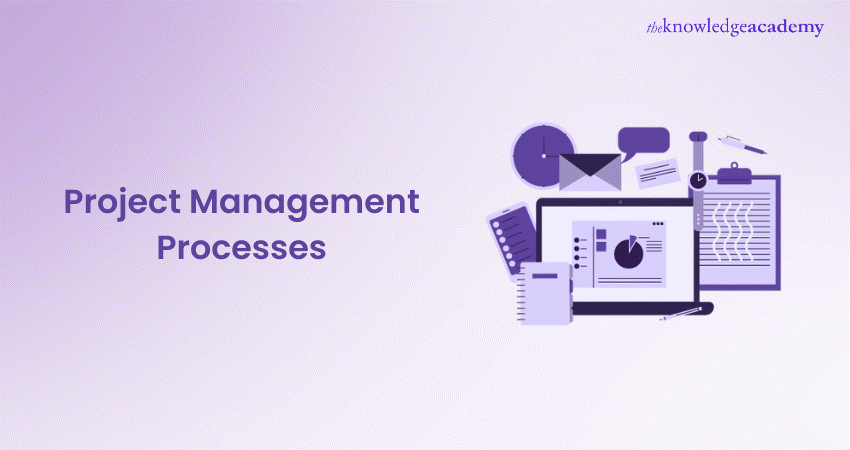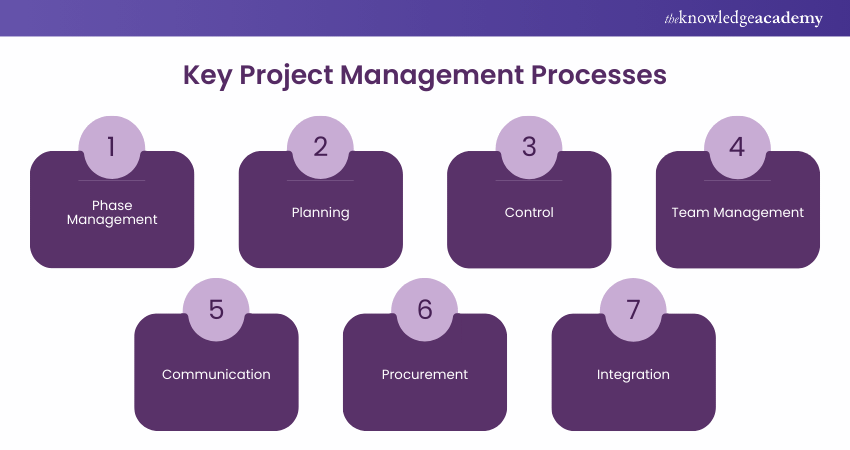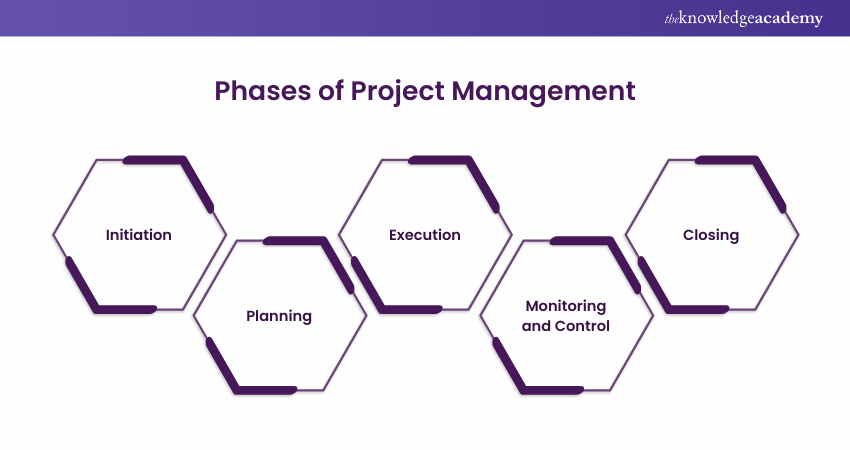We may not have the course you’re looking for. If you enquire or give us a call on +61 1-800-150644 and speak to our training experts, we may still be able to help with your training requirements.
Training Outcomes Within Your Budget!
We ensure quality, budget-alignment, and timely delivery by our expert instructors.

Efficient Project Management is important for the successful completion of projects; it acts as the bridge between initial ideas and final outcomes. Effective Project Management Processes ensure that a project is completed on time, within budget, and also meets its objectives. At the heart of these processes is a systematic, structured approach to planning, executing, monitoring, and closing projects.
Today, most projects that meet their original goals set by the organisations. This high percentage is achieved when the Project Management culture is highly prioritised. Project Management Processes provide a roadmap for Project Managers and their teams, helping them navigate the complexities of any Project, big or small. In this blog, you will get a brief overview of the Project Management Processes, the key phases in the processes, how to utilise them, and more.
Table of Contents
1) A Brief Overview of Project Management Processes
2) Key Project Management Processes
3) Phases of Project Management
a) Initiation
b) Planning
c) Execution
d) Monitoring and Control
e) Closing
4) Conclusion
A Brief Overview of Project Management Processes
Project Management Processes provide a structured framework for initiating, planning, executing, monitoring, and closing Projects. They guide Project Managers and teams through every stage of a Project's lifecycle. They also help in ensuring that resources are allocated effectively, timelines are met, and goals are achieved.
At the initiation stage, the project's viability and scope are determined. Project Planning involves detailing the Project's path, resources, and risk management. During execution, tasks are delegated and carried out. The monitoring phase ensures that the project stays on track, identifying and rectifying any deviations. Finally, the closure phase reviews the Project's success and delivers the end product. These processes are the foundation for delivering successful projects.
Key Project Management Processes
Project Management isn't just about overseeing tasks and ensuring they're completed. It's about executing a Project methodically, ensuring that every detail is attended to and that the end result aligns with the intended objectives. For this, a structured set of processes is paramount. Let’s discuss the key Project Management Processes and understand their significance.

a) Phase Management: Regularly revisiting the Project Initiation document ensures alignment with established goals throughout each phase. Team members confirm their understanding of goals and individual roles. Upon completing phase deliverables, teams progress to the next phase.
b) Planning: Revisiting required resources at the start of each phase enhances budget and timeline adherence, increasing overall project success.
c) Control: Tracking metrics and utilising reports allows control over budget, scope, time, and issues within each phase.
d) Team Management: Project Managers support and train team members, ensuring timely access to necessary tools and providing training before each phase.
e) Communication: Delegating communication responsibilities keeps all team members, resources, and stakeholders informed. This enables Project Managers to focus on planning, procurement, and integration tasks.
f) Procurement: Identifying necessary resources, seeking contractor bids, and managing budgets and Project Management Timelines ensure efficient resource procurement. Closing contracts promptly maintains workflow.
g) Integration: Project Managers coordinate various processes and teams, ensuring seamless collaboration. Planning coordination strategies and regular Effective Communication updates keep team members informed of progress affecting their work.
Unlock success in your Projects – register now for our Project Management Courses.
Phases of Project Management
Project Management, a dynamic discipline, involves a systematic approach to guide projects from conception to completion. The journey unfolds through five key phases, each pivotal in ensuring project success and delivering tangible outcomes.

1) Initiation
The Project initiation Phase is the genesis of a project, where the groundwork is laid for its entire lifecycle. Central to this phase is developing a compelling business case that outlines the project's necessity. The project charter, a cornerstone document, encapsulates essential details such as constraints, goals, budget allocation, and the appointment of a Project Manager. While this phase sets a clear project goal, it refrains from delving into technical specifics. Identifying key stakeholders becomes imperative, involving the creation of a stakeholder register that delineates roles, designations, communication needs, and influence levels.
2) Planning
The planning phase is a meticulous endeavour that shapes the project's roadmap. Beyond the initiation, this phase commands a substantial portion of the project's timeline. Tasks include identifying technical requirements, developing a detailed project schedule, formulating a communication plan, and establishing goals and deliverables. Noteworthy Project Management Methodologies include Specific, Measurable, Achievable, Relevant, Time-bound (SMART) plan and Collaborative, Limited, Emotional, Appreciable, Refinable (CLEAR) plan which are commonly employed. The project scope is defined and subject to change with proper approval. A Work Breakdown Structure (WBS) visually represents the project, while timelines, communication plans, risk mitigation strategies, and Change management plans are meticulously crafted.
Empower your Project Management skills with our course on Project Management Green Belt.
3) Execution
In this phase, the Project Manager handles procurement and assembles the team. Effective execution of project objectives requires skilled team management. The PM delegates tasks, oversees progress, and ensures the project stays on schedule and within budget while maintaining solid relationships with the team. Being highly organised and an exceptional leader is crucial, as the PM must address team concerns and issues, necessitating frequent, open communication with all team members and stakeholders.
4) Monitoring and control
In this process group, Project Managers closely monitor the project’s progress to ensure proper Project Execution. This involves data collection, verbal updates, and written status reports. As the SME Toolkit explains, “Planning defines what needs to be done, while monitoring and controlling assess how well project execution is being carried out.” Monitoring identifies any necessary corrective actions or adjustments to maintain project alignment.
5) Closing
The closing process group begins once stakeholders produce and validate project deliverables. In this phase, the Project Manager finalises contracts with suppliers, vendors, consultants, and other third-party providers. All documentation is archived, and a final project report is prepared. The troubleshooting and maintenance plan, the final part of the project plan, is implemented.
Master the art of Project Management with our Project Management Certification - Join now!
Conclusion
Project Management Processes are essential for guiding projects from inception to completion. By following structured processes, businesses can enhance workflows, ensure timely delivery, and achieve desired outcomes. Implementing these procedures increases productivity, fosters collaboration, and supports sustainable success, making them a vital component of any effective business strategy.
Start mastering Project Management with our Project Management Course – Register now!
Frequently Asked Questions

Utilise project management software, communication platforms, and time-tracking tools throughout the project. These tools make tasks more efficient, improve teamwork, and guarantee punctual completion, increasing project effectiveness.

Mastering Processes in Project Management boosts career growth by enhancing efficiency, ensuring successful project delivery, and establishing a reputation for effective leadership. This improves decision-making, minimises risks, and builds confidence among stakeholders, paving the way for career advancement.

The Knowledge Academy takes global learning to new heights, offering over 30,000 online courses across 490+ locations in 220 countries. This expansive reach ensures accessibility and convenience for learners worldwide.
Alongside our diverse Online Course Catalogue, encompassing 17 major categories, we go the extra mile by providing a plethora of free educational Online Resources like News updates, Blogs, videos, webinars, and interview questions. Tailoring learning experiences further, professionals can maximise value with customisable Course Bundles of TKA.

The Knowledge Academy’s Knowledge Pass, a prepaid voucher, adds another layer of flexibility, allowing course bookings over a 12-month period. Join us on a journey where education knows no bounds.

The Knowledge Academy offers various Project Management Courses, including the Project Management Certification, Project Risk Management Course, and Project Management Black Belt. These courses cater to different skill levels, providing comprehensive insights into How to get into Project Management.
Our Project Management Blogs cover a range of topics related to Management, offering valuable resources, best practices, and industry insights. Whether you are a beginner or looking to advance your Project Management skills, The Knowledge Academy's diverse courses and informative blogs have got you covered.
Upcoming Project Management Resources Batches & Dates
Date
 Introduction to Project Management Course
Introduction to Project Management Course
Thu 1st Jan 1970







 Top Rated Course
Top Rated Course



 If you wish to make any changes to your course, please
If you wish to make any changes to your course, please


